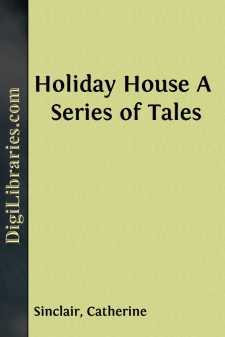Categories
- Antiques & Collectibles 13
- Architecture 36
- Art 48
- Bibles 22
- Biography & Autobiography 813
- Body, Mind & Spirit 142
- Business & Economics 28
- Children's Books 15
- Children's Fiction 12
- Computers 4
- Cooking 94
- Crafts & Hobbies 4
- Drama 346
- Education 46
- Family & Relationships 57
- Fiction 11828
- Games 19
- Gardening 17
- Health & Fitness 34
- History 1377
- House & Home 1
- Humor 147
- Juvenile Fiction 1873
- Juvenile Nonfiction 202
- Language Arts & Disciplines 88
- Law 16
- Literary Collections 686
- Literary Criticism 179
- Mathematics 13
- Medical 41
- Music 40
- Nature 179
- Non-Classifiable 1768
- Performing Arts 7
- Periodicals 1453
- Philosophy 64
- Photography 2
- Poetry 896
- Political Science 203
- Psychology 42
- Reference 154
- Religion 513
- Science 126
- Self-Help 84
- Social Science 81
- Sports & Recreation 34
- Study Aids 3
- Technology & Engineering 59
- Transportation 23
- Travel 463
- True Crime 29
Holiday House A Series of Tales
Description:
Excerpt
The minds of young people are now manufactured like webs of linen, all alike, and nothing left to nature. From the hour when children can speak, till they come to years of discretion or of indiscretion, they are carefully prompted what to say, and what to think, and what to look, and how to feel; while in most school-rooms nature has been turned out of doors with obloquy, and art has entirely supplanted her.
When a quarrel takes place, both parties are generally in some degree to blame; therefore if Art and Nature could yet be made to go hand in hand towards the formation of character and principles, a graceful and beautiful superstructure might be reared, on the solid foundation of Christian faith and sound morality; so that while many natural weeds and wild flowers would be pruned and carefully trained, some lovely blossoms that spring spontaneously in the uncultivated soil, might still be cherished into strength and beauty, far excelling what can be planted or reared by art.
Every infant is probably born with a character as peculiar to himself as the features in his countenance, if his faults and good qualities were permitted to expand according to their original tendency; but education, which formerly did too little in teaching “the young idea how to shoot,” seems now in danger of over-shooting the mark altogether, by not allowing the young ideas to exist at all. In this age of wonderful mechanical inventions, the very mind of youth seems in danger of becoming a machine; and while every effort is used to stuff the memory, like a cricket-ball, with well-known facts and ready-made opinions, no room is left for the vigour of natural feeling, the glow of natural genius, and the ardour of natural enthusiasm. It was a remark of Sir Walter Scott’s many years ago, to the author herself, that in the rising generation there would be no poets, wits, or orators, because all play of imagination is now carefully discouraged, and books written for young persons are generally a mere dry record of facts, unenlivened by any appeal to the heart, or any excitement to the fancy. The catalogue of a child’s library would contain Conversations on Natural Philosophy,—on Chemistry,—on Botany,—on Arts and Sciences,—Chronological Records of History,—and travels as dry as a road-book; but nothing on the habits or ways of thinking, natural and suitable to the taste of children; therefore, while such works are delightful to the parents and teachers who select them, the younger community are fed with strong meat instead of milk, and the reading which might be a relaxation from study, becomes a study in itself.
In these pages the author has endeavoured to paint that species of noisy, frolicsome, mischievous children which is now almost extinct, wishing to preserve a sort of fabulous remembrance of days long past, when young people were like wild horses on the prairies, rather than like well-broken hacks on the road; and when, amidst many faults and many eccentricities, there was still some individuality of character and feeling allowed to remain. In short, as Lord Byron described “the last man,” the object of this volume is, to describe “the last boy.” It may be useful, she thinks, to show, that amidst much requiring to be judiciously curbed and corrected, there may be the germs of high and generous feeling, and of steady, right principle, which should be the chief objects of culture and encouragement....


